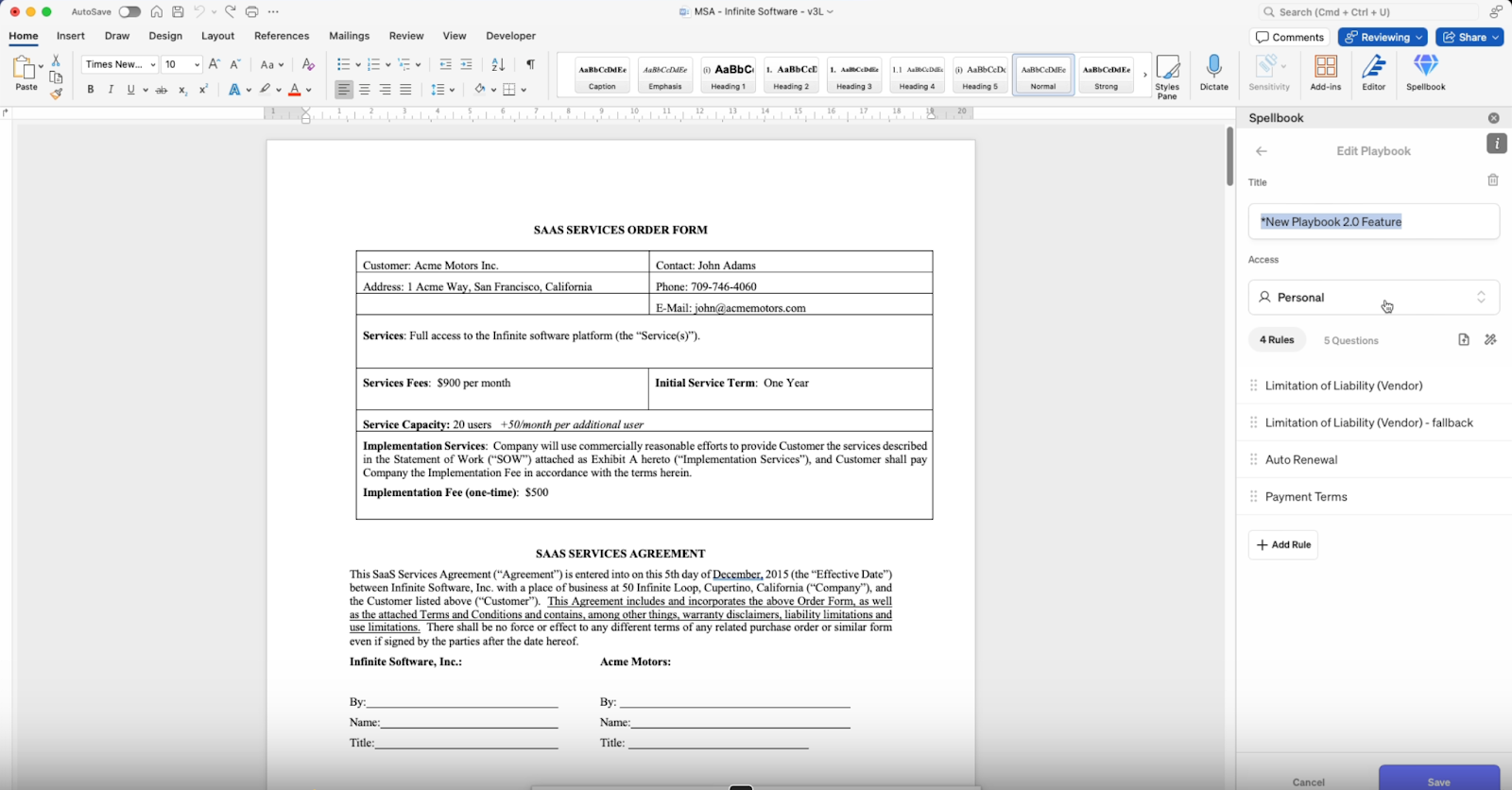
Top 5 AI Legal Research Assistants for Your Law Firm in 2025

Have you ever spent hours drowning in case law, wondering if there’s a faster way to finish research? After adopting AI tools, lawyers have saved countless hours of research time.
With AI assistants, you can complete legal research, document review, and contract analysis in minutes. They minimize human errors and suggest language improvements while helping to ensure compliance with the latest regulations. Plus, having AI handle repetitive tasks reduces staffing and operational costs.
Want to experience these benefits and more? Continue reading as we share the top five AI legal research assistants to consider in 2025.
5 Best Legal AI Assistants to Optimize Your Law Firm
With so many AI legal tools out there, how do you pick the best? We’ve tried several, but Spellbook remains our top choice.
What’s special about Spellbook? It seamlessly works in Microsoft Word, analyzes contract clauses in real time, and uses AI to find relevant precedent language during contract drafting. Plus, it automates error detection and compliance checking, keeping your firm efficient and accurate.
Here are the top five AI legal assistants to choose from, including Spellbook.
1. Spellbook
Did you know that nearly 2,000 law firms trust Spellbook? It’s the ultimate AI legal assistant for fast, accurate contract drafting, review, and analysis. During drafting and review, AI generates clauses, detects risks, suggests improvements, and ensures compliance with custom review checklists.
With Spellbook’s Ask feature, lawyers can engage directly with contract text by posing plain-language questions to clarify terms, interpret clauses, or identify key obligations. The AI responds instantly with context-aware answers and concise summaries, streamlining review and enhancing understanding, especially useful when working with multilingual contracts or international clients.
To further boost efficiency, Spellbook offers customizable templates and playbooks that help firms maintain consistency and apply best practices across teams. Its benchmarking capability flags deviations from industry norms, which allows lawyers to refine language and reduce risk. Together with the Ask feature, these tools transform contract work into a more accurate, agile, and strategic process.
Using Spellbook allows legal professionals to focus on strategy instead of wasting time on repetitive tasks. Lawyers work faster, reduce errors, and ensure regulatory compliance with ease.
{{cta-surprise-red}}
2. Legalfly
Legalfly is an AI solution that automates workflows for legal teams. Aside from making legal research and document review a breeze, it also highlights key points and suggests revisions, while ensuring they’re in compliance with legal standards.
It also offers customized templates that make drafting contracts easier, saving time and reducing errors. Categorizing laws and regulations helps to further cut down the time lawyers spend on legal documents.
Legalfy takes pride in its promise of data security with advanced anonymization tools to ensure confidentiality and compliance during legal research. Seamlessly integrated with Microsoft Word, Legalfly fits into existing workflows, organizing and retrieving legal documents using AI for enhanced efficiency.
3. Lexis+ AI Tools
Lexis+ is a fully integrated legal ecosystem that connects with practice management tools, such as Time Matters and PCLaw, to streamline case management, calendaring, and billing. With APIs, law firms can integrate Lexis+ into their internal systems, making research and workflow seamless.
Lexis+ AI is the advanced artificial intelligence engine behind Lexis+, designed to elevate legal research with greater speed, precision, and depth. It delivers intelligent insights, legal analytics, and tailored practice guidance that empowers lawyers to draft with confidence, uncover stronger arguments, and make better-informed strategic decisions.
4. Ivo
What sets Ivo apart from other AI tools is its ability to deliver context-aware analysis tailored to each firm’s unique policies and review standards. It precisely scans contracts and legal documents to highlight key clauses, risks, and obligations, which accelerates decision-making without sacrificing accuracy. Ivo also enables seamless collaboration and integrates with existing legal tech platforms to support consistent, team-wide document review.
Cloud storage on Google Cloud and Microsoft Azure ensures that legal documents are organized and retrieved by AI while meeting compliance regulations. AI assists in verifying compliance with legal standards, ensuring confidentiality and data security at every step.
5. Casetext
Casetext takes the hassle out of legal research, making it more efficient. Its AI-powered tools provide access to an extensive legal database, with everything you need at your fingertips.
With Parallel Search, you can type a simple sentence describing a legal issue, and Casetext will find cases with similar fact patterns and principles. It covers federal and state case law dating back to 1925, along with federal statutes, regulations, and over 100,000 briefs. Whether you prefer natural language or Boolean searches, Casetext lets you research quickly and accurately.
Key Features of an AI Legal Assistant
AI has been a hot topic for years, but not all AI legal assistants are created equal. Here’s what to look for to find the right one.
Legal-Specific Training
An effective AI legal assistant isn’t just general AI repackaged—it’s trained specifically on legal language, workflows, and standards. This specialization enables it to understand legal nuances, suggest relevant clauses to include in contracts, flag potential risks, and compare contract terms against industry benchmarks more accurately than generic AI tools.
Document Review and Analysis
These features make it more efficient and accurate to find specific terms and clauses, potential risks, and compliance issues during contract and legal document review. By automating this process, law firms can reduce errors, expedite due diligence, and enhance accuracy, allowing lawyers to focus on strategy.
Customizable Playbooks and Templates

Customizable playbook embedded in Microsoft Word by Spellbook
Legal drafting, review, and compliance become more consistent with prebuilt and customizable playbooks that offer predefined clause libraries, fallback positions, and automated redlining. These tools streamline workflows while allowing for customization to meet each client’s specific needs.
Integration into Legal Workflows
AI legal assistants that embed directly into existing platforms, such as Microsoft Word, allow legal teams to use familiar tools and avoid disrupting their workflow. This in-context functionality supports real-time contract and document drafting and review, with AI assistance that feels effortless.
Benefits of Using AI Legal Assistants
Utilizing AI for legal research is about becoming more efficient and working smarter. Here’s how using AI legal assistants will benefit you:
- Speed: AI can perform legal research in mere seconds, providing lawyers with instant and relevant results they need.
- Accuracy: AI analyzes legal texts accurately, ensures up-to-date research, and minimizes errors.
- Cost Reduction: Automating research cuts overhead costs by reducing the need for support staff.
AI Legal Assistants vs. Human Paralegals
Speed or strategy? Consistency or adaptability? How about all of them at once?
AI legal assistants can retrieve case law, analyze contracts, and flag risks in seconds, far faster than human paralegals. But only humans bring critical thinking skills and effective legal judgment, making them essential for complex legal work.
Consistency is one of AI’s strengths. It never tires. AI works 24/7, handling repetitive tasks with unmatched efficiency. However, legal cases require more than task completion. Paralegals offer legal reasoning and adaptability, ensuring a deeper understanding of complex and nuanced issues.
As AI takes over routine tasks, it doesn’t just reduce costs; it increases efficiency and enables paralegals to focus on client engagement and lawyer support. Instead of fearing that AI will replace legal professionals, consider it a valuable tool that works alongside them to enhance their potential and create a more efficient legal team.
Curious about how AI compares to human legal experts? Read our AI vs. Lawyers guide.
{{cta-surprise-red}}
Key Takeaways
- AI legal assistants boost efficiency by handling research, document review, and compliance tasks quickly to save law firms time and money.
- Using AI legal assistants helps ensure accuracy and consistency while minimizing errors, streamlining workflows, and enhancing legal decision-making.
- AI legal assistants complement human expertise by automating routine tasks, allowing lawyers and paralegals to focus on strategy, client interactions, and complex legal work.
Frequently Asked Questions
Are AI Legal Research Assistants Reliable for Sensitive and Complex Cases?
Yes, but with limits. AI tools like Lexis+ AI and Casetext can provide fast, accurate legal research using advanced AI. However, they should support, not replace, human expertise. Lawyers must verify findings to ensure accuracy and nuanced legal interpretation.
How Can an AI Legal Research Assistant Improve My Legal Research Process?
An AI legal assistant quickly finds relevant case law, statutes, and precedents, eliminating tedious searches. Tools like Lexis+ AI and Casetext allow you to search using plain English rather than complex Boolean operators. AI can broaden your research, uncovering cases and legal insights you may otherwise miss. You get faster, more accurate results, allowing you to focus on strategy instead of manual research.
How Does AI Technology Ensure the Confidentiality and Security of Legal Data?
AI legal tools protect confidential data with robust security measures, including end-to-end encryption, secure cloud storage, and strict access controls.
Platforms like Ivo and Lexis+ AI follow SOC 2 Type II standards, ensuring data integrity and compliance with regulations such as GDPR and CCPA. Regular security audits, penetration testing, and AI-driven anomaly detection help prevent breaches. Many tools also offer on-premise deployment for firms needing extra control. With these safeguards, AI ensures that legal data remains secure and private.
Thank you for your interest! Our team will reach out to further understand your use case.






